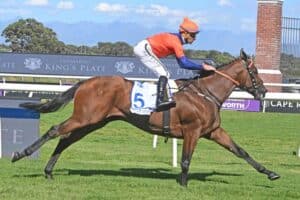Some researchers reckon The Darley Arabian’s bloodline is present in 95% of racehorses around the world today.
One of the races summarily renamed following the announcement of the Hong Kong Jockey Club’s sponsorship of next weekend’s Gold Cup meeting at Greyville was The Darley Arabian (Listed). That’s a shame.
@Worldpool Twitter Handicap doesn’t have the same lyrical ring, does it?
Of course, money talks, and financially pressed racing operator Gold Circle must grab every cash injection it can. Sentiment cannot compete with cents, and The Darley Arabian is a name of pure sentiment – an homage to perhaps the most important horse in the history of thoroughbred racing.
ALSO READ: Hong Kong brings Eastern magic to the Gold Cup
Almost all modern racehorses are descended from just three Arabian stallions, one of whom was The Darley Arabian. The others were The Byerley Turk and the Godolphin Arabian (or Godolphin Barb), who are also commemorated by Gold Circle with races at Scottsville.
These three horses, who lived at the turn of the 17th century, were of versatile, nippy desert breeds that impressed the English voyaging class and were mated with tough local mares to produce a fast new type: what became known as the thoroughbred.
These super-equines proved faster and taller than the scrubby specimens then being raced. It wasn’t long before they were exported to England’s dominions where racing was starting to take off.
Strong bloodline
Some researchers reckon The Darley Arabian’s bloodline is present in 95% of racehorses around the world today.
It all started in Aleppo, one of the oldest continuously inhabited cities in the world and the recent epicentre of a bloody civil war in modern-day Syria.
The bay Arabian colt – originally named Ras El Fedowi (The Headstrong One) – was born in Aleppo and bought in 1702 by Thomas Darley, Queen Anne’s Consort to the Levant (Syria) at the height of the Ottoman Empire. At the time, England, via the Levant Company of London, controlled a lot of Asia-Europe trade through Aleppo.
ALSO READ: Cream of SA racing poured into a glittering Gold Cup
Details of the transaction are sketchy. It seems Darley paid 300 sovereigns to Sheikh Mirza for the colt, who had grown to an imposing (at the time) 15 hands, intending it as a gift for either his father or brother back home in Yorkshire.
One tale has it that the sheikh tried to cancel the deal, but Darley got a bunch of sailors to steal the horse and smuggle it out of the Levant via the port of Smyrna.
In Yorkshire, The Darley Arabian was immediately put to stud. Darley described his acquisition as “immediately striking owing to his handsome appearance and exceedingly elegant carriage”.
Quality genes
His genes added speed to the strength of the local mares and he became the champion sire of Britain and Ireland in 1722.
His most accomplished son was unbeaten Flying Childers, regarded as the first star racehorse and the subject of umpteen equine oil paintings of the 18th century.
Another son was Bulle Rock, the first thoroughbred exported to the US and a foundation
stallion of North America.
A great-great-grandson was Eclipse, an even more revered hero of the turf and probably the most
influential of all thoroughbred sires – with his Y chromosome evident in just about all racehorses today.
The Darley Arabian covered mares from 1705 until 1720 and lived to the grand old age of 30. It’s a monumental legacy.
But @Worldpool Twitter pays the bills.






